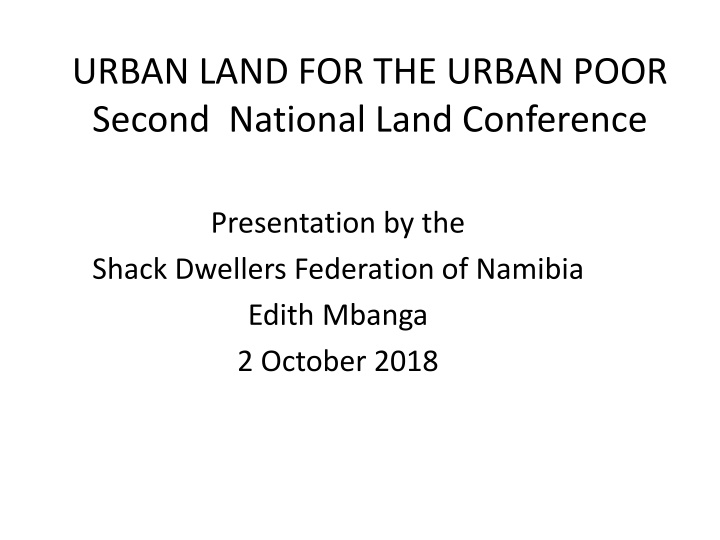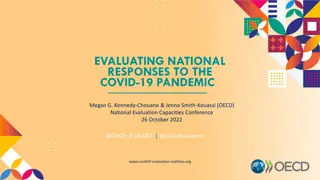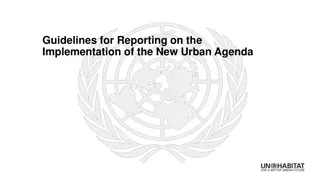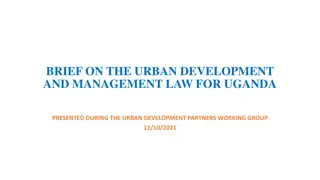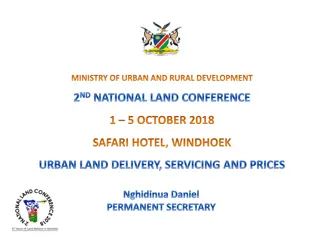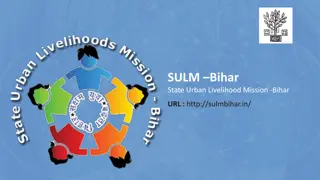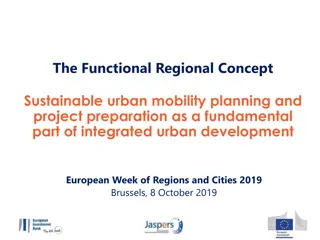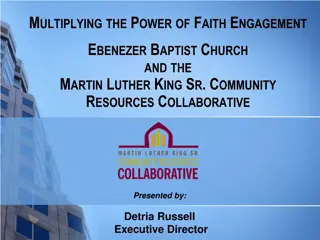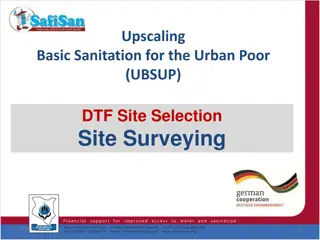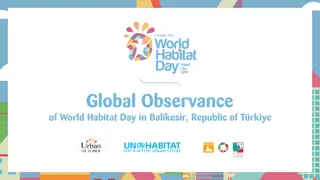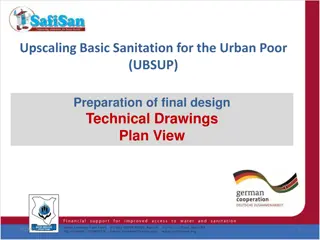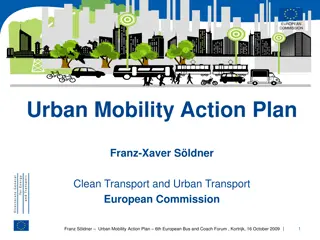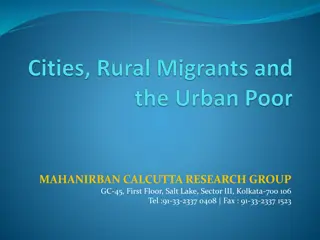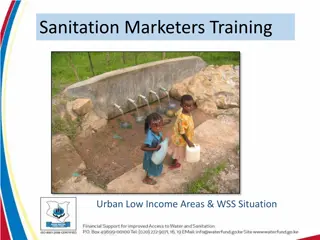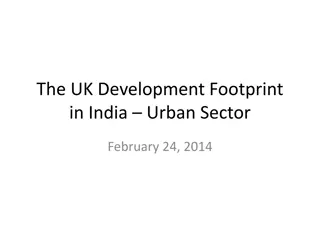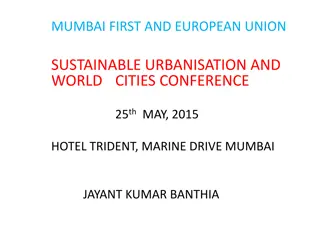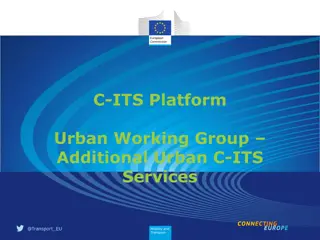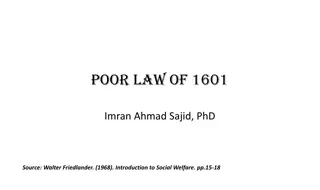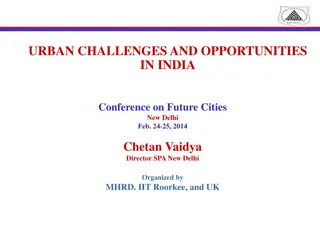Empowering Urban Poor Through Collaborative Development Initiatives
Shack Dwellers Federation of Namibia, comprising 805 saving groups with over 25,000 members, primarily women earning less than N$4,000, has made significant strides in improving urban living conditions. Their achievements include substantial savings, housing projects, land acquisitions, and informal settlement upgrades. Utilizing tools like CLIP, the Federation engages in collaborative land development efforts, involving communities, local authorities, and stakeholders for sustainable urban development.
Download Presentation

Please find below an Image/Link to download the presentation.
The content on the website is provided AS IS for your information and personal use only. It may not be sold, licensed, or shared on other websites without obtaining consent from the author.If you encounter any issues during the download, it is possible that the publisher has removed the file from their server.
You are allowed to download the files provided on this website for personal or commercial use, subject to the condition that they are used lawfully. All files are the property of their respective owners.
The content on the website is provided AS IS for your information and personal use only. It may not be sold, licensed, or shared on other websites without obtaining consent from the author.
E N D
Presentation Transcript
URBAN LAND FOR THE URBAN POOR Second National Land Conference Presentation by the Shack Dwellers Federation of Namibia Edith Mbanga 2 October 2018
INTRODUCTION Shack Dwellers Federation of Namibia is made up of 805 saving groups living in shacks in Informal Settlement and Backyards , Rented rooms and who have organized ourselves 25,000 members, majority women, earning less than N$4,000 are affiliated By working together to improve living conditions for our families with the potential to impact more than 100,000 people directly
ACHIEVEMENTS Daily saving starting with as little as a dollar a day resulted in a total saving of N$29 million By producing our own hollow blocks, doing our own excavation and managing our own construction as groups we produced 4,900 houses, currently costing less than N$40,000 per house In 1995 we established our own Poor People Fund and channeling N$123 million (N$49 million contributed by MURD) through this revolving fund, which we used for our houses, installing services and small business loans. We secured land for 8,500 households through negotiations with Local Authorities. We buy and develop blocks of land, the servicing costing less than N$5,000 per household Starting with Community Land Information Program (CLIP) in informal settlement we initiated informal settlement upgrading involving 5,000 households
Information for Urban Development: Community Land Information Program (CLIP) Working with MURD, local authorities and informal settlement communities the Shack Dwellers Federation collect information in informal settlements In 2008 we counted 235 informal settlements with 135,000 shacks accommodating about 500,000 people through informal settlement profiling The current updated numbers show that there are 308 informal settlements with 228,000 shacks accommodate about 995,000 people This means close to 40% of the Namibia population are now living in shacks in urban areas
CLIP as a tool for collaborative land development CLIP data produced by communities helps them, local authorities and other stakeholders to plan for development based on the communities needs and realistic affordability. Communities contribute to their own development by participating in planning studios and the installation of services. The pilot project in Gobabis Freedom Square informal settlement, enabled a learning process where five informal settlements in 5 towns are following this process This demonstrates it is possible to scale up inclusive urban development through a partnership process
CHALLENGES OF URBAN LAND Urban land delivery failed to meet the needs of people, whether they moved into towns or being born in towns, therefore households are not able to construct houses, causing high rentals and informal settlement formation Top-down, costly and lengthy land development processes limit the scaling up of delivering land to the poor - It results in developments that are very costly to government and local authorities (N$50,000 to N$80,000 per fully serviced erf) and not affordable to the poor - It is lengthy and those on the waiting lists and informal settlements have no idea by which time they will obtain their own land or what the costs will be - The possibility of the bulk infra structure investments reaching more people is limited by plot sizes and engineering standards - It does not encourage the use of resources like people s saving and their labour contribution - It lacks the potential for the communities to participate in planning and upgrading and become involved in the development - It limits opportunities for incremental development options reaching more people with security of tenure and basic services
AFFORDABILITY/LAND PRICING Monthly income of households in informal settlements are below N$3,000 and on average N$1,500 Can only afford between N$375 and N$750 per month for both land, shelter and services Propose: - we need to reach a solution that will reach the majority of the population - Subsidies for bulk infrastructure - Enable finance for Communities to install water and sanitation services themselves
Land Sizes and Standards These are limiting development and upgrading. Saving Groups in Windhoek looked at affordability of the land and the high number of landless waiting for land and decided to share 300 square meter plots. We also are concerned about: If people are relocated to make space for plots this will take people further from their places work Loosing income when relocated Proposal Accept higher densities and find design and land rights solution fitting the densities
PROPOSAL: SCALE UP LAND DELIVERY BASED ON EXPERIENCES AND LEARNING: City/Urban Wide planning and Informal settlement upgrading in partnership to increase access to land on local level Based on information collected through CLIP in informal settlements, back yards and waiting lists Participatory planning Incremental development Learning and capacity building program with stakeholders to inform a national strategy
